ALIEN INVASION
Spraying of controversial herbicide on Vaal River water lettuce begins – critics urge caution
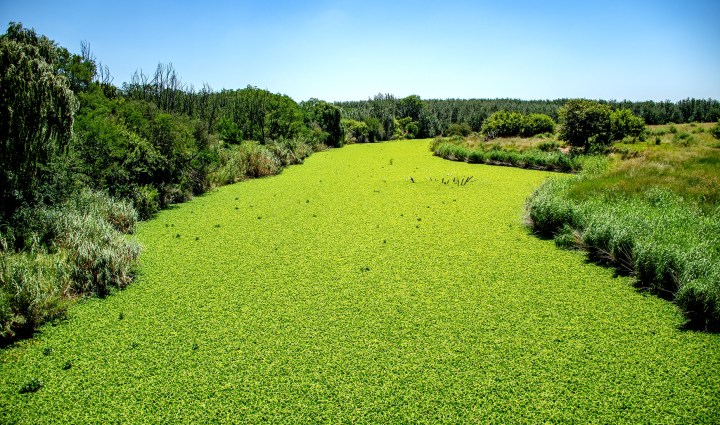
As the invasive water lettuce continues to multiply along the Vaal River, Rand Water has begun an integrated response to halt the growth, spraying herbicide on the plants and releasing weevils as biological control agents. While the response is seen by some as necessary to urgently address socioeconomic implications, it’s seen as controversial by others.
‘Under ideal conditions, it is safer and smarter to just implement biological control,” said Dr Leslie Hoy, the environmental management services manager for Rand Water.
“But you have a huge mat [of water lettuce], and that mat is impacting on people’s livelihoods, impacting on tourism, and impacting on people who rely on fishing on the Vaal Barrage. So you need to deal with it.”
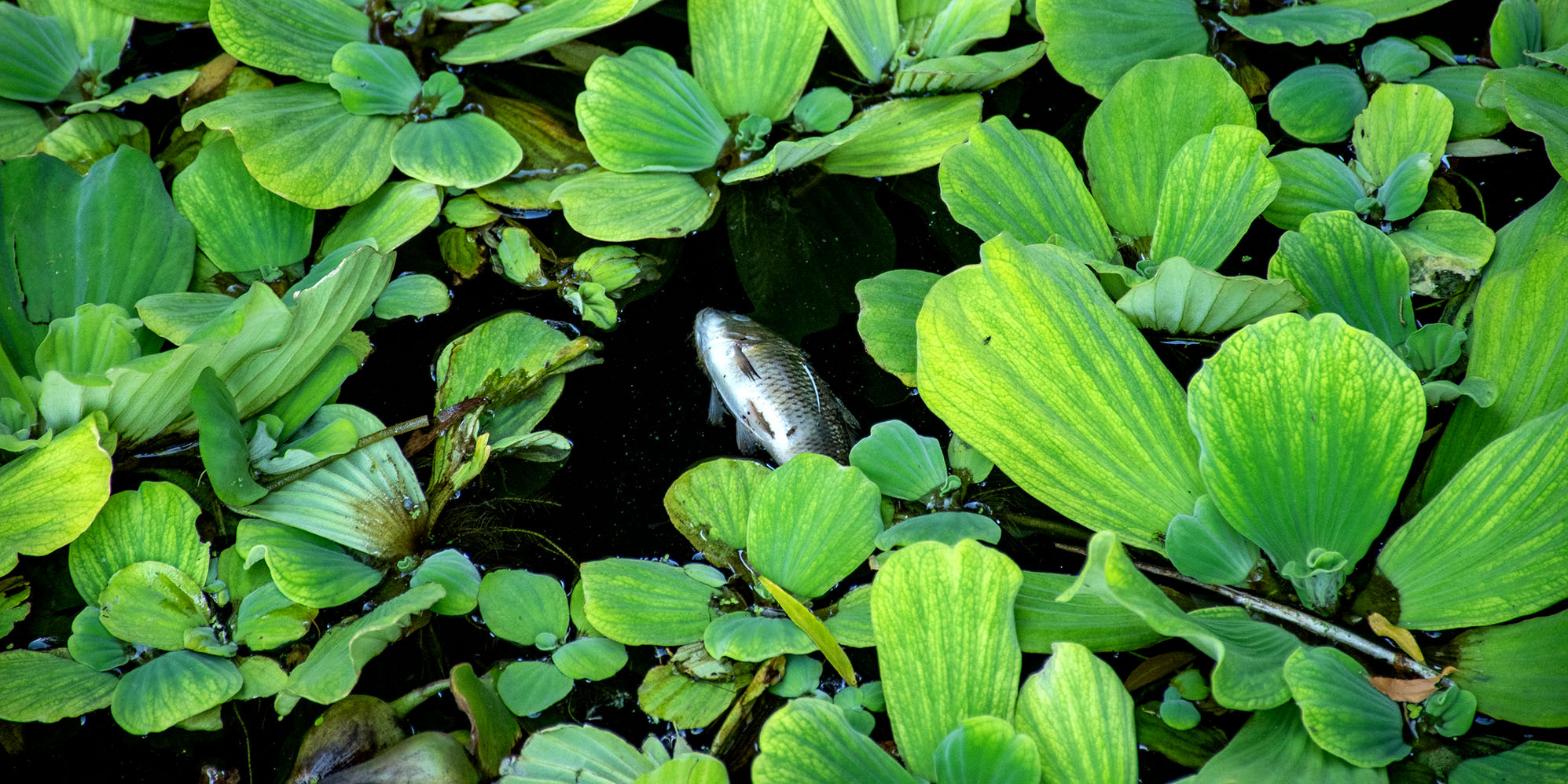
Water lettuce blankets the water body, forming a ‘mat’ of just leaves, blocking out sunlight and preventing photosynthesis, greatly reducing oxygen levels, which can result in fish die-off. (Photo: Julia Evans)
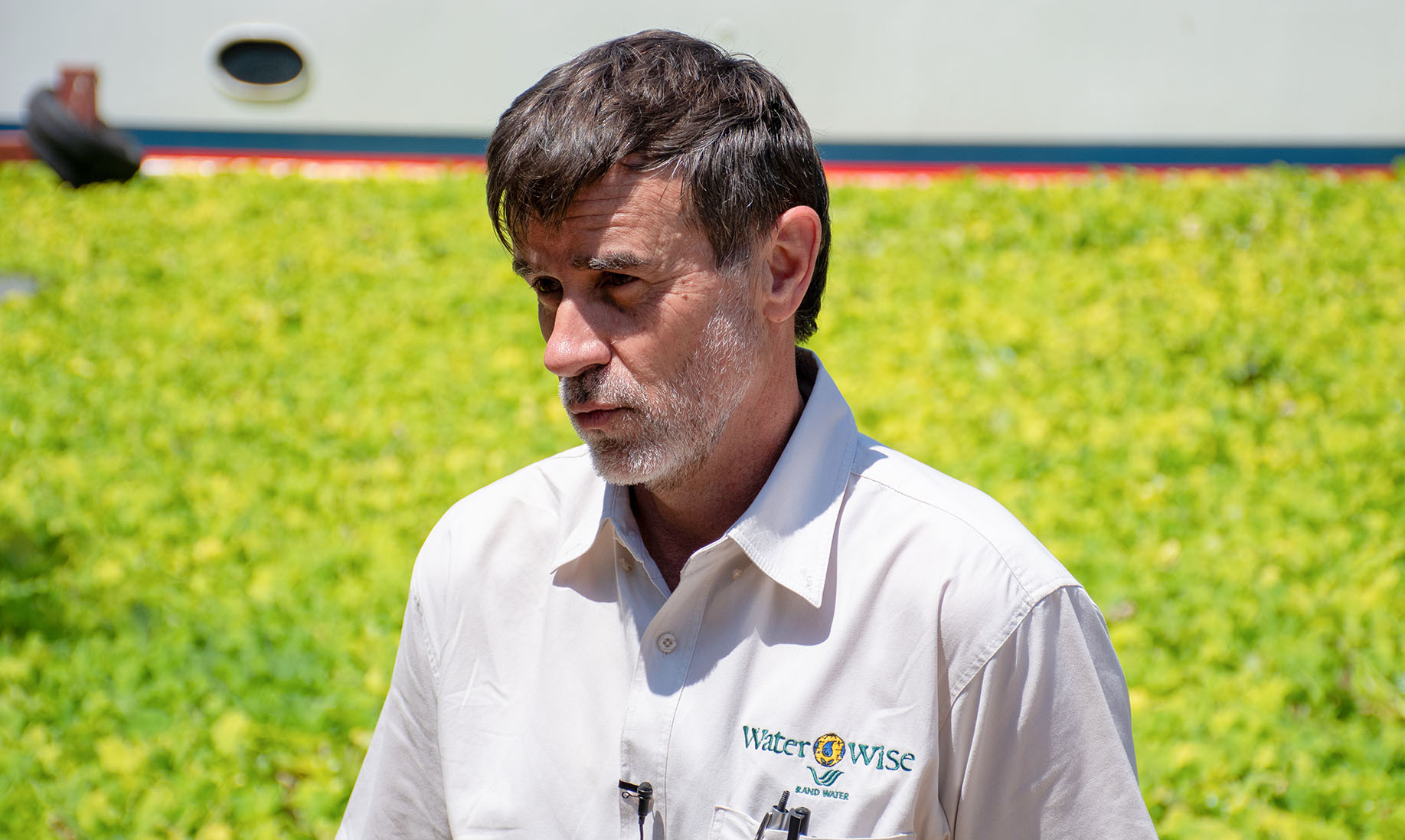
Dr Leslie Hoy, environmental management services manager at Rand Water. (Photo: Julia Evans)
Hoy was speaking to Daily Maverick on the banks of the Vaal River in Vanderbijlpark on Thursday, 15 February. It has become overrun with water lettuce and some water hyacinth – invasive aquatic species that have environmental and socioeconomic implications.
Water lettuce exploded along the Vaal River in December 2023, causing residents to urgently find a solution to deal with the ever-growing plants.
Read more in Daily Maverick: Rapid water lettuce spread threatens Vaal River — weevils could be the solution
Rand Water was given an urgent general authorisation by the Department of Water and Sanitation (DWS) to begin an integrated approach to manage the water lettuce, which includes physical removal, biocontrol and chemical application, as advised by experts by the Department of Forestry, Fisheries and Environment (DFFE).
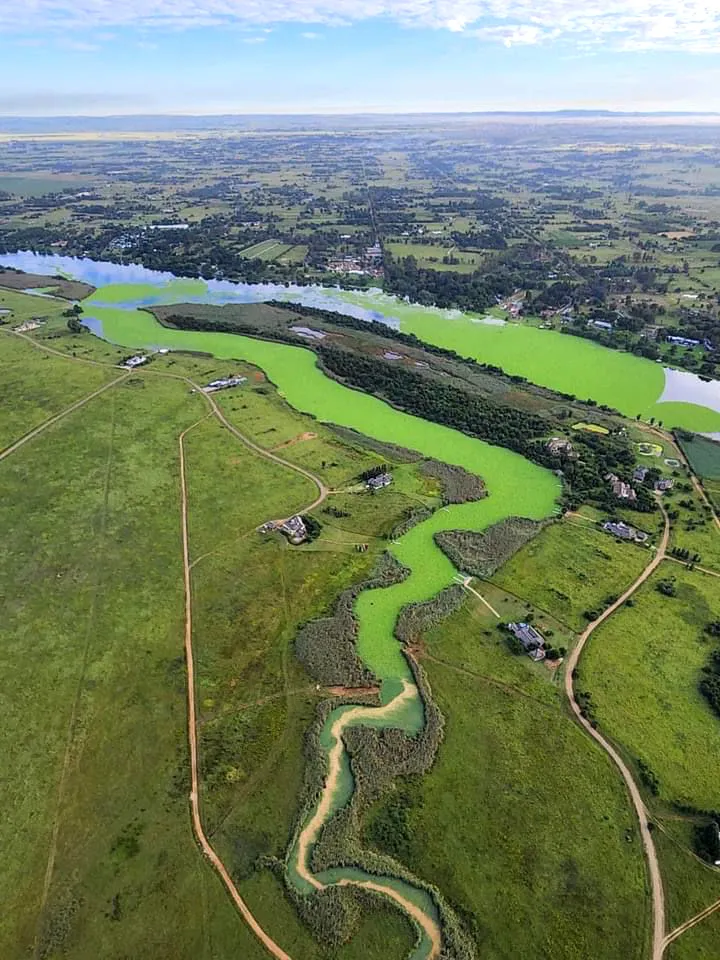
To deal with the ever-growing invasive species water lettuce in the Vaal River, Rand Water has embarked on an integrated approach that includes physical removal, biocontrol and chemical application. (Photo: Sourced)
Glyphosate-containing herbicide was sprayed on the invasive water lettuce in sections of the Vaal River on 13 February in a sub-lethal dose. Rand Water said specific formulations of the glyphosate that were recommended are made based on DFFE expert opinion and research and this work is being monitored for compliance.
This has caused some controversy with many people concerned that using glyphosate-based herbicides – which is the most heavily applied herbicide in the world – would affect human health and drinking water.
“People are only looking at a section of the puzzle by not looking at the entire [problem] to understand the enormous impact,” said resident Thomas De Toit.
“The thing is we’re in crisis mode, and if it was left for decisions, and the volume doubled every two weeks. Time was absolutely against the community.”
Darryl Zaayman from The View on Vaal Resort said the water lettuce had a huge impact on tourism.
“We normally accommodate between 45 to 50 fishermen daily, they come and visit our facility. That number has literally dropped to four or five. So the financial impact of this has been massive,” Zaayman said during a stakeholder meeting with Rand Water at Stonehaven on the Vaal on Thursday.
“An integrated approach is the best way to deal with an invasion,” said Dr Julie Coetzee, a biological control scientist launching the biocontrol programme. “And the fastest way to knock these plants down is with a herbicide.”
Hoy said that the sub-lethal dose they used means the water lettuce won’t be killed outright: “You will kill them slowly and you’re knocking them back.”
Hoy explained that the whole growth system of the plant is impacted “and in that slowing down, you are giving other mechanisms a chance to come into play such as the biocontrol, and where possible physical removal.
“We just felt that this was really extreme and that we wanted to get it under a more manageable mass.”
Hoy added in earnest, “I understand concerns about glyphosate, and I really hope people are not freaked out by it… We’re trying to do the right thing.”
Concerns around glyphosate
Bettina Genthe, an independent consultant, previously at CSIR, has 40 years of experience in environmental health related to water quality. Genthe told Daily Maverick that she was concerned to hear they were using glyphosate because recent studies had shown that this widely used chemical herbicide could contaminate drinking water sources and air, could cause neurological diseases, and had been categorised by the World Health Organization as a probable human carcinogen.
However, Genthe said, “the dose is everything,” and that if Rand Water was using glyphosate only as an interim measure, and not routinely spraying the chemical, the exposure length would be less harmful. If the dose was repeatedly sprayed, it resulted in a higher dose in total, “because there would be adverse health effects in higher doses and on a prolonged basis”.
Hoy said that “to our knowledge, and because it was approved by DFFE, I am working on the basis that it will not negatively impact the water health,” and this is because they have taken all the precautions they are advised to.
Rand Water is using a specific formulation and non-lethal dosage rates they are required to comply with, and Hoy said that this low dose would be dilated by the large water body of the Vaal River and that the spray was targeted at the plants, which were grouped in targeted areas by the local community, not at the water body.
Hoy said there might be a need to spray again, but it was hard to pre-empt at this stage.
The area that is currently being affected by the water lettuce is below the abstraction points for Rand Water (Rand Water extracts from Vaal Dam). However, downstream of the spraying is a supply source for a major crop irrigation project (the Vaal-Harts government irrigation scheme).
Dr Ferrial Adam, executive director of citizen science organisation WaterCAN, said “while glyphosate may not have been sprayed in close proximity to Rand Water’s extraction areas, concerns arise regarding downstream water users’ potential impact”.
However, Hoy said this was not of concern because the dosage rate they complied with ensured it did not end up in drinking water.
“Rand Water has not done anything that goes against the law… We really want to do the best thing that we can,” said Hoy.
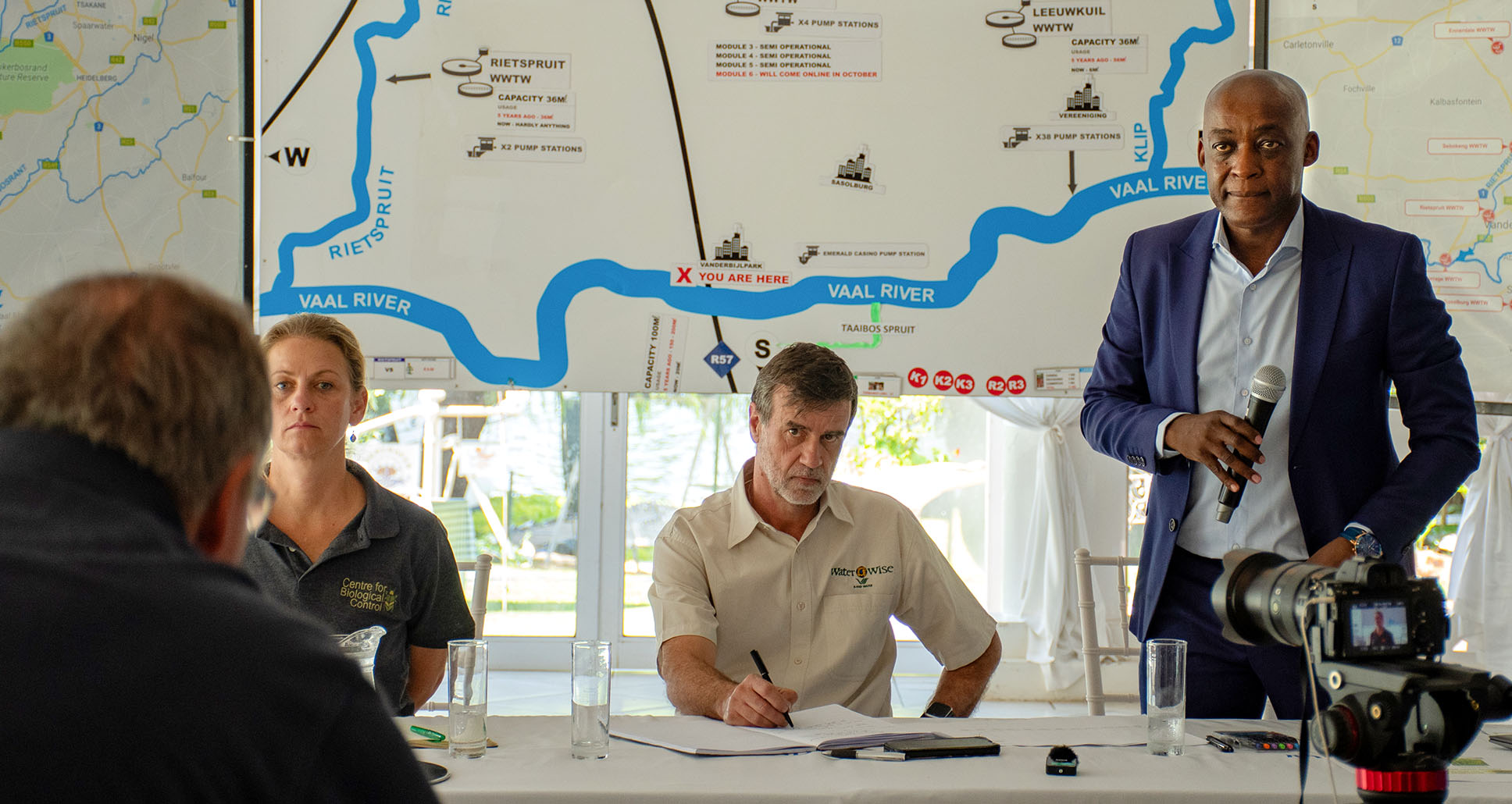
From left: Dr Julie Coetzee from the Centre for Biological Control, Dr Leslie Hoy from Rand Water and Mbuyiswa Makhubela from Rand Water during a meeting on 15 February 2024 with media and stakeholders about Rand Water’s approach to halting the spread of the water lettuce in the Vaal River, Vanderbijlpark. (Photo: Julia Evans)
Dr Samuel Motitsoe, an aquatic ecologist based at Wits University, said, “I think we should, by all means, stay away from chemical control/spraying in any dose because this is simply a quick fix and never sustainable.
“Let’s not look for quick solutions but rather make informed decisions that will not have long-term ecological impacts on our aquatic systems, the same way Racheal Carson’s Silent Spring warned us.”
Motitsoe added, “There is growing evidence that the chemical does affect aquatic microbes in the water column and on the sediments which are crucial on important ecosystem structure, functions and processes on aquatic systems. Thus the application of glyphosate in aquatic systems should not be taken lightly, more so that its fate is still under question.”
Professor Anthony Turton, a water resource management specialist at the University of Free State, holds similar views, stating that he is opposed to the use of glyphosate and that its use is irresponsible.
Turton said that along with glyphosate having an international reputation for being extremely controversial, he noted that the Water Research Commission’s 2023 study on glyphosate levels in SA cautioned that there were human health impacts that were as yet not fully understood.
“The report suggests that there is a very strong possibility of intergenerational impacts from the DNA-altering characteristics of this chemical,” said Turnton.
“So my response is very simple – the Precautionary Principle must prevail… If there is any question about the long-term human health impact of glyphosate, until such time as we know for certain what that is, we are obliged to err on the side of caution, and not use glyphosate.”
“The challenge lies in the potential development of immunity in water lettuce over prolonged exposure,” said Adam. “This immunity buildup can render the spraying less effective, and although the initial dosage may not be lethal, it can escalate into a significant problem over time.”
Adam also advocated against continued spraying of glyphosate, which has been banned in many countries around the world, and for bioremediation efforts.
Weevils (biocontrol)
“Water lettuce biocontrol is one of the best biocontrol programmes against invasive weeds in the world, but we need to ask people to be patient,” said Coetzee, the Deputy Director of the Centre for Biological Control (CBC), which once had a contract with the DFFE to implement biocontrol in SA.
Ecologist Motitsoe agreed, saying “I would advise that we dive straight to biocontrol… the weevil is effective in controlling the weed and we should just invest in mass rearing the weevil and releases. Our research has shown promising aquatic system recovery (ecologically) following biocontrol of aquatic weeds and this is a bonus looking at it from a conservation lens.”
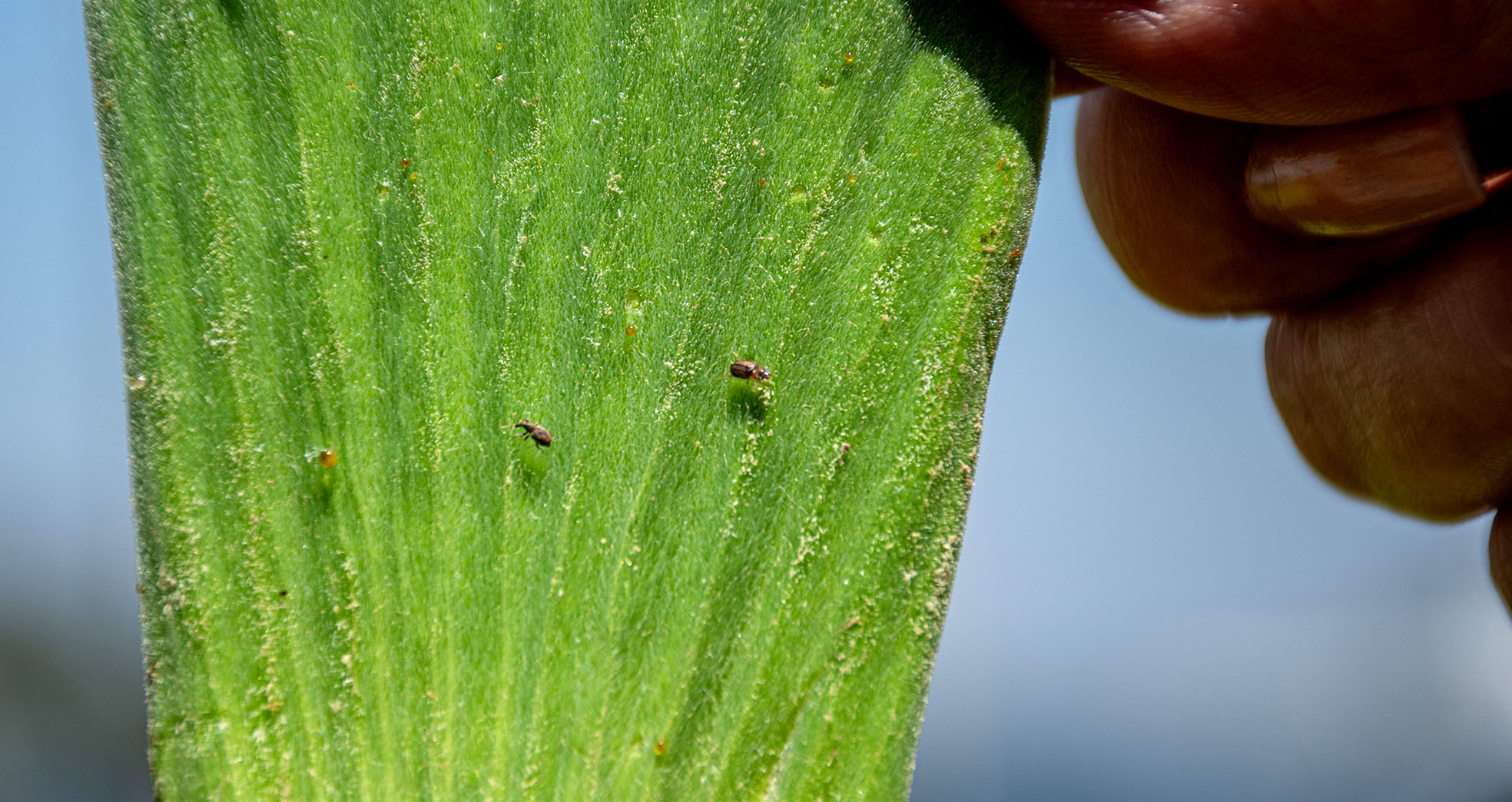
Weevils, small insects, are being used as a biological control agent to feed on and tunnel into the leaves of water lettuce causing them to become waterlogged and sink. (Photo: Julia Evans)
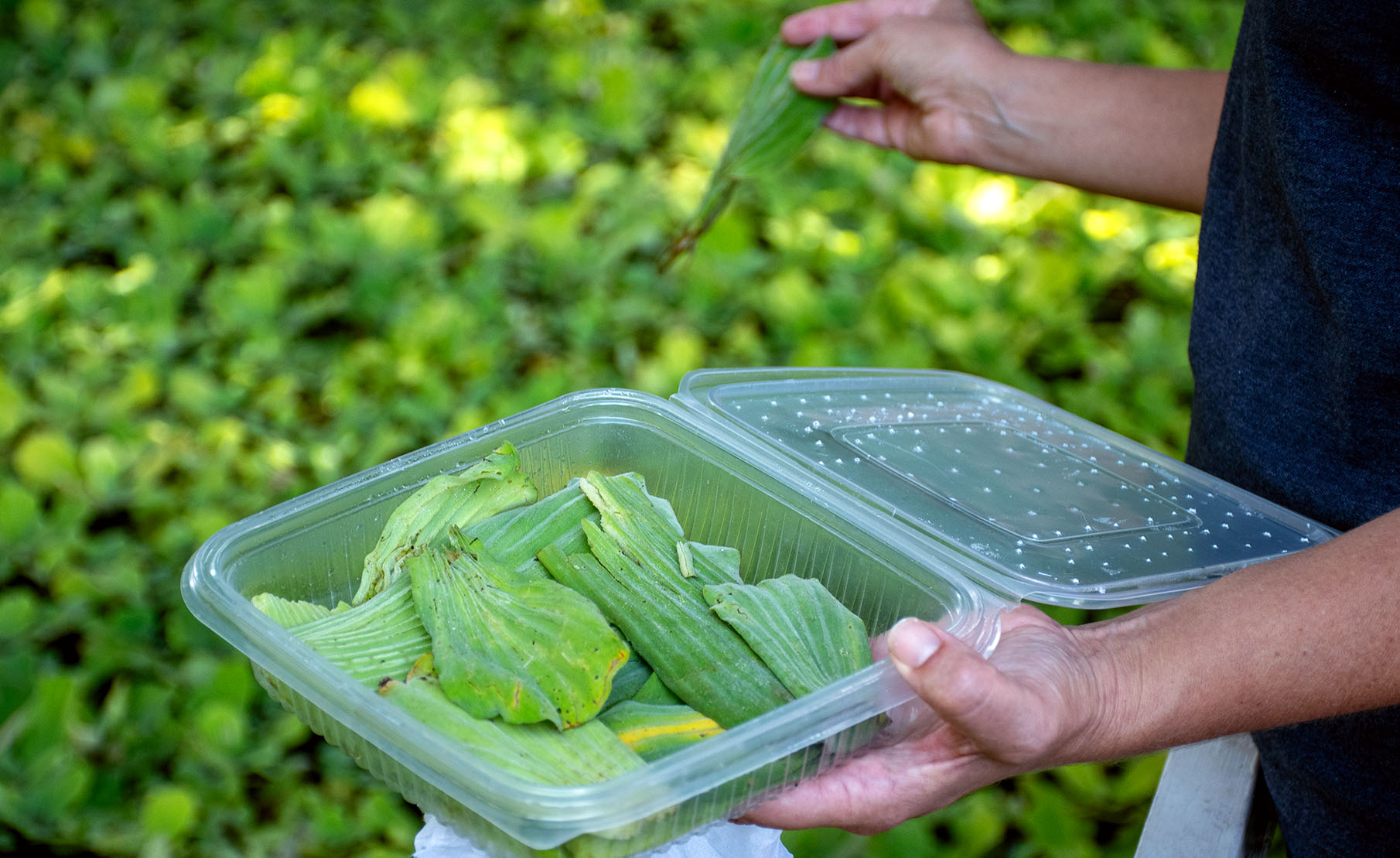
The Centre for Biological Control at Rhodes University has a rearing station for weevils (small insects on the water lettuce), and can mail these biological control agents to other parts of the country where they can be reared and used on invasive species. (Photo: Julia Evans)
And Hoy from Rand Water agreed that in an ideal world, just biocontrol would be used to deal with the invasives – but it is a layered issue, influenced by socioeconomic and time constraints.
Coetzee said that while she didn’t “necessarily think that this chemical spray is a good thing”, she was glad Rand Water had an integrated plan that included biocontrol and was prioritising it as the long-term solution.
On Thursday, Coetzee released the first biological control agents (weevils) outside Stonehaven on Vaal, to signal the start of the project, where weevils (reared at the CBC’s rearing centre at Rhodes University) will be released into specific areas that are reserved for biological control – where there’s no chemical spraying or mechanical removal – to create “biocontrol reserves”.
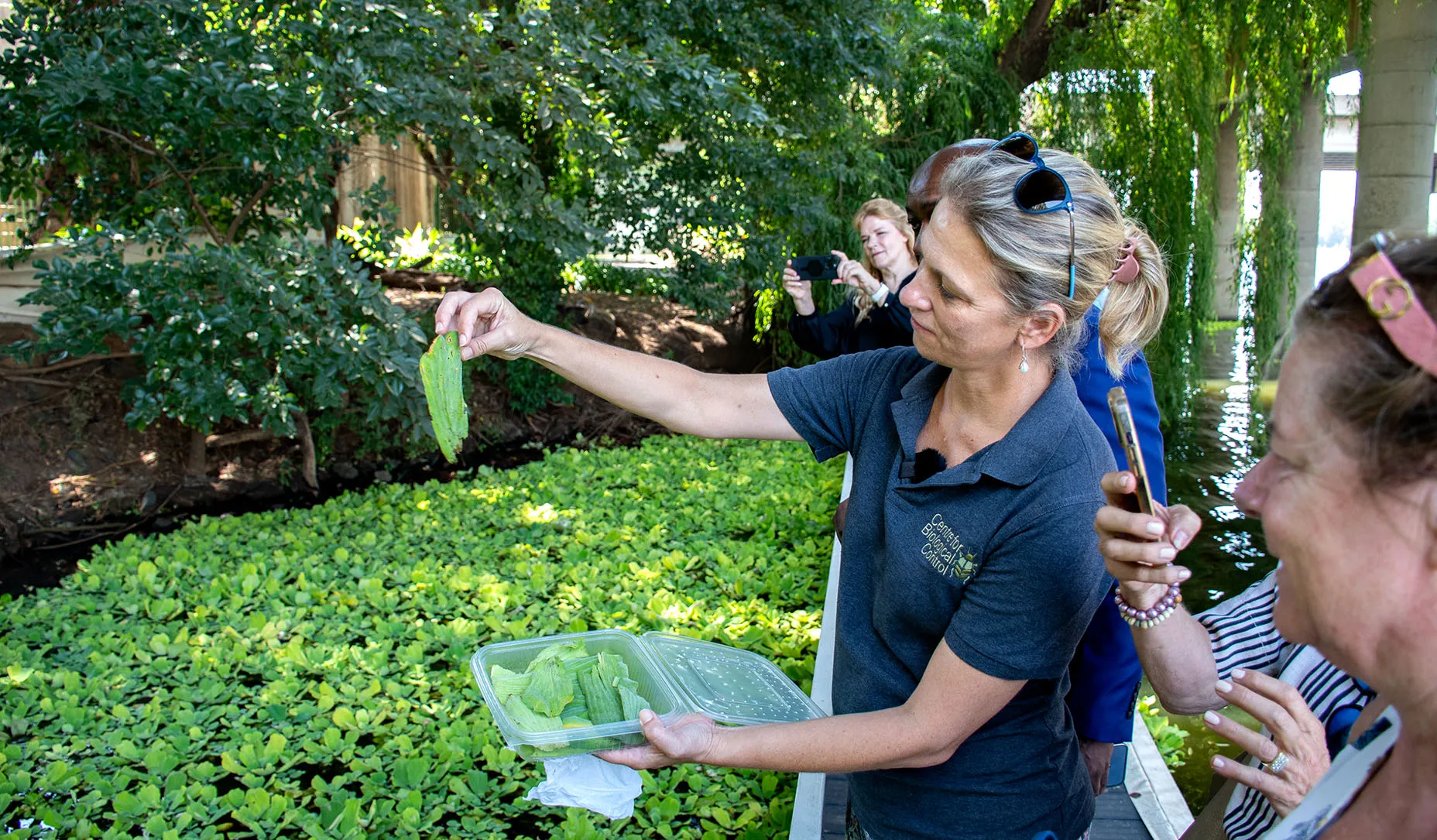
Dr Julie Coetzee, the deputy director at the Centre for Biological Control releases the first weevils (biological control agents), that feed on water lettuce, into the Vaal River on 15 February 2024. (Photo: Julia Evans)
“We don’t know what glyphosate does to the weevils, it’s never been tested,” said Coetzee. “So we don’t know if there’ll be direct mortality effects or if it will be indirect through plants dying.”
Rand Water is planning on entering into a memorandum of understanding with the CBC and has already set up a “hot house” in Alberton, where weevils can be reared.
The plan is for the CBC to supply the initial weevils and for Rand Water and residents to set up rearing stations and grow weevils so that when they have sufficient numbers, they can release more.
The underlying issue
While debates swarm between which is the best solution to deal with these invasive species, as Turnton previously told Daily Maverick, this is like treating a symptom while ignoring the underlying illness.
The underlying cause of this issue is that the water in the Vaal River is eutrophicated — it has high levels of nutrients caused by sewage, agricultural run-off and industrial waste flowing into the river, creating an ideal environment for invasives to spread.
“Without addressing the sewage pollution flowing into the Vaal River, the cycle of water lettuce growth in the Vaal River could persist for decades,” said Adams. “Hartbeespoort serves as a grim example of what happens when such pollution goes unchecked, leading to severe compromise in water quality. We cannot afford to let other dams and rivers suffer the same fate.”
Another concern is that when the water lettuce is removed it will allow in sunlight, enabling the proliferation of cyanobacteria, which has toxins that can cause respiratory illnesses.
“My prediction is, in the next 24 months, we’re going to see an explosion, an exponential growth of blue-green algae in the Vaal River,” said Turton.
Following questions sent by Daily Maverick, Department of Fisheries, Forestries and Environment Minister Barbara Creecy and Department of Water and Sanitation Minister Senzo Mchunu said they have noted public concerns related to the use of chemical glyphosate to clear alien invasive plants from the Vaal River by Rand Water.
Their department said in a joint statement that the two ministers and other relevant parties have met and agreed to determine whether the clearing methods followed were in line with the regulatory environment and to devise a future plan that ensures that the clearing of the alien invasive plants is done in a manner that poses no harm to the environment.
Once that process is concluded, the departments said they will issue a further statement on the way forward. DM
This story was updated to post-publication to include a statement from the departments of environment and water.






















 Become an Insider
Become an Insider
Kindly correct your article to include the proper titles of the individuals – Professor Julie Coetzee is introduced just as Julie Coetzee while male contributors are referred to as “Dr” or “Professor”. In addition, there is a photo with a caption showing “Julie Coetzee”(no title) next to “Dr” Hoy.
Prof Coetzee is a senior academic and should be acknowledged as such next to male counterparts.
I am sure this is an oversight but these subtle forms of sexism is something I know the DM does not wish to promote.
Eutrophication means levels of nutrient which promote plant growth. If run-off from farms and sewage works continues to pollute the river and stimulate plant growth, control is very difficult. As Dr Turton says, the problem should be dealt with at its root, otherwise it is like a diabetic continuing to guzzle sugar and looking for drugs to control the problem.
Addressing the symptoms without addressing the underlying water quality issues is pointless. This is only nature taking the gap and trying to improve water quality. The water quality has deteriorated due to negligence and incompetence by legally responsible persons and supervising authorities. Why is there no enforcement and prosecution?
This is like putting lipstick on a pig. The pig might look prettier but it remains a pig.
I don’t know how so many professionals et this so wrong. Herbicides and biocontrol will appear to work, for a while but the problem will return. Then we add more herbicides, which will negatively affect biocontrol. Vaal river will become a toxic soup and this is where much of Gauteng gets it’s drinking water from.
The only voice of reason is Turtons, who tells us the real villain is the wanton destruction of the municipal waste water treatment works,which, by the way, is Rand Water’s responsibility.
Stop this madness. Fix the sewage works, and nature will return our clear and healthy water to us.
Where is dr Turtin’s inputs ?
Why are we as Homo sapiens such a dumb species? We are the only species that pollutes our water sources with our waste manure and our toxic agricultural runoff. Then we wonder why Nature responds with these massive algae and water lettuce blooms to try and fix the problem. And then we double-down on our stupidity by spraying more chemicals to try and fix the problem? If an alien was looking down on us they could only conclude that we were doing our best to fight Nature and that we were a suicidal species, intent on destroying our own living habitats.
The way to stop this is to stop dumping our waste into our rivers. Our sewerage (the black gold of humanure) belongs in the top 60cm of soil, where the right bacteria are found that can decompose it and turn it into precious and rich soils. Also, stop allowing farmers to destroy the health of food consumers with toxic agri-chemicals, leading to this type of excess nitrogen run-off. Return to a world where we work WITH Nature, not AGAINST her. For now, let the water lettuce do its work and start to control it in consideration of all other affected biodiversity.
weevils etc will not stop the root problem too much sewage in the river. a problem will be replaced by another problem and so the cycle will continue. no plants then a dirty river. yuk glad we dont life near there
Just a thought – have these experts considered a more modern approach to this problem? One could consider mechanical intervention through biomimicry. Perhaps autonomous robotic systems modelled after aquatic predators like fish or birds that actively seek out and consume the invasive plants? These robots could be equipped with sensors and artificial intelligence to detect and selectively target the unwanted vegetation while avoiding harm to native species.